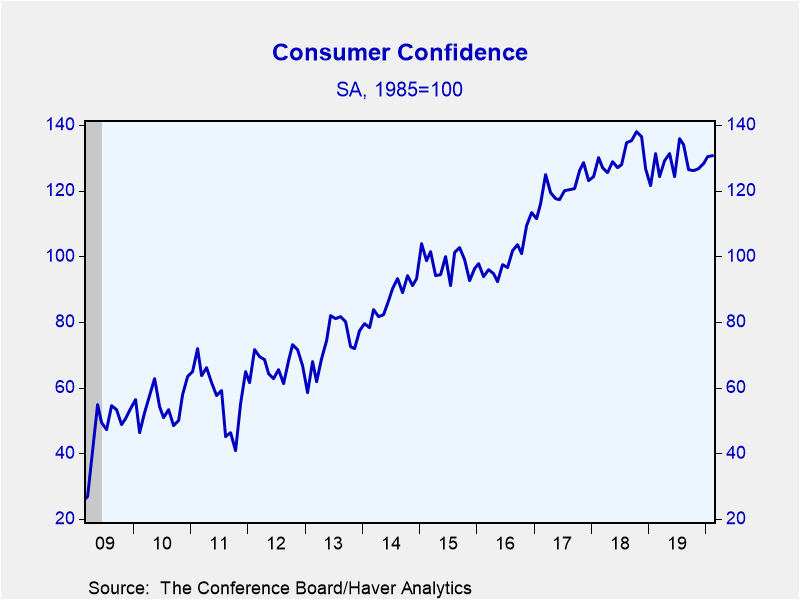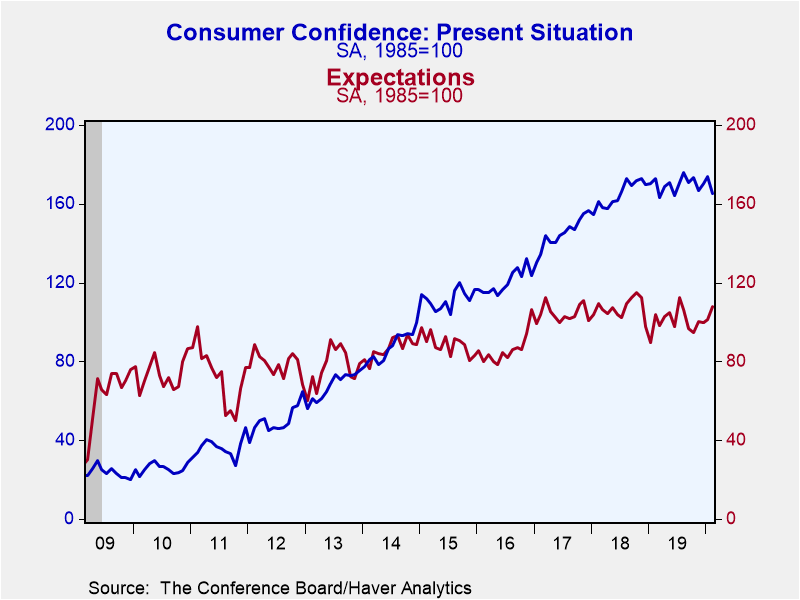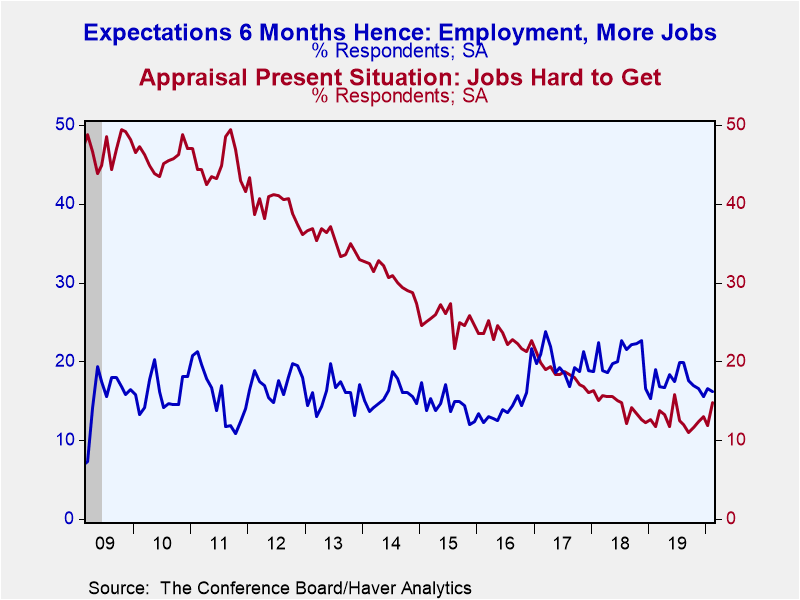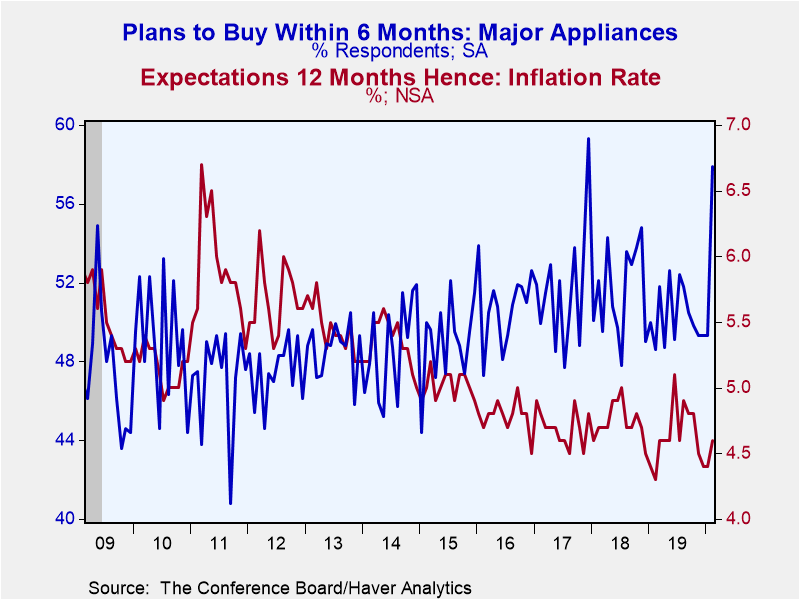 Global| Feb 25 2020
Global| Feb 25 2020U.S. Consumer Confidence Firms as Expectations Improve
by:Tom Moeller
|in:Economy in Brief
Summary
The Conference Board's Consumer Confidence Index rose 0.2% (-0.5% y/y) during February to an index level of 130.7 (1985=100). The rise followed a 1.7% January increase, revised from 2.7%. An increase to 132.5 had been expected in the [...]
The Conference Board's Consumer Confidence Index rose 0.2% (-0.5% y/y) during February to an index level of 130.7 (1985=100). The rise followed a 1.7% January increase, revised from 2.7%. An increase to 132.5 had been expected in the Action Economics Forecast Survey. Over the last 20 years, there has been a 70% correlation between the level of confidence and the y/y change in real consumer spending.
A higher expectations reading led the overall increase with a 6.3% rise (3.9% y/y) to 107.8 which followed a 1.4% gain. It was offset by a weakened present situation reading which fell 5.1% (-4.5% y/y) to 165.1, after having risen 2.0% in January.
The decline in the present situations reading reflected a lessened 38.6% of respondents indicating that business conditions were good. The figure was 40.9% last July. The jobs reading also fell to the lowest level since June 2019. The reading of "jobs hard to get" rose sharply, also to the highest level since June.
On the expectations front, the higher reading reflected a gain to 20.4% in respondents who felt that business conditions would improve. The figure had been trending lower, however, since the middle of last year. A steady 16.2% of respondents thought that there would be more jobs, but that was down from 22.1% in Q3'18. A steady 22.0% felt that income would increase.
Expectations for consumer price inflation in twelve months rose to 4.6%, its highest level since October. A lessened 44.1% felt that interest rates would increase, down from 72.3% in the middle of 2018. On the housing front, a greatly increased 2.4% of respondents planned to buy a new home and a strengthened 57.9% intended to buy a major appliance. The percentage of respondents who planned to buy a new car also surged.
Within age groups, confidence amongst respondents who were under age 35 improved m/m, but remained below the high six months earlier. Confidence amongst respondents aged 35-54 also rose to a six-month high. Confidence amongst respondents over age 55 fell sharply m/m but remained up slightly y/y.
The Outlook for the Economy and Monetary Policy in 2020 from Loretta J. Mester, President & CEO, Federal Reserve Bank of Cleveland is available here.The Consumer Confidence data are available in Haver's CBDB database. The total indexes appear in USECON, and the market expectations are in AS1REPNA.
| Conference Board (SA, 1985=100) | Feb | Jan | Dec | Feb Y/Y % | 2019 | 2018 | 2017 |
|---|---|---|---|---|---|---|---|
| Consumer Confidence Index | 130.7 | 130.4 | 128.2 | -0.5 | 128.3 | 130.1 | 120.5 |
| Present Situation | 165.1 | 173.9 | 170.5 | -4.5 | 169.8 | 164.8 | 144.8 |
| Expectations | 107.8 | 101.4 | 100.0 | 3.9 | 100.6 | 107.0 | 104.3 |
| Consumer Confidence By Age Group | |||||||
| Under 35 Years | 137.4 | 132.6 | 133.1 | -5.4 | 134.2 | 133.7 | 130.2 |
| Aged 35-54 Years | 130.9 | 124.9 | 127.9 | -1.9 | 130.7 | 132.2 | 123.5 |
| Over 55 Years | 126.9 | 133.8 | 126.2 | 0.6 | 123.8 | 126.3 | 112.9 |
Tom Moeller
AuthorMore in Author Profile »Prior to joining Haver Analytics in 2000, Mr. Moeller worked as the Economist at Chancellor Capital Management from 1985 to 1999. There, he developed comprehensive economic forecasts and interpreted economic data for equity and fixed income portfolio managers. Also at Chancellor, Mr. Moeller worked as an equity analyst and was responsible for researching and rating companies in the economically sensitive automobile and housing industries for investment in Chancellor’s equity portfolio. Prior to joining Chancellor, Mr. Moeller was an Economist at Citibank from 1979 to 1984. He also analyzed pricing behavior in the metals industry for the Council on Wage and Price Stability in Washington, D.C. In 1999, Mr. Moeller received the award for most accurate forecast from the Forecasters' Club of New York. From 1990 to 1992 he was President of the New York Association for Business Economists. Mr. Moeller earned an M.B.A. in Finance from Fordham University, where he graduated in 1987. He holds a Bachelor of Arts in Economics from George Washington University.
More Economy in Brief
 Global| Feb 05 2026
Global| Feb 05 2026Charts of the Week: Balanced Policy, Resilient Data and AI Narratives
by:Andrew Cates










